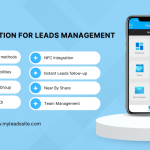Lead management systems are becoming increasingly popular among businesses of all sizes and industries. In today’s digital age, where customers have more options than ever before, companies need a structured approach to managing their leads and maximizing their chances of converting them into paying customers.
What is a Lead Management System?
A lead management system is a set of processes and tools that companies use to capture, track, and manage leads or potential customers throughout the sales cycle. The goal of a lead management system is to increase sales revenue by ensuring that sales teams are equipped with the necessary information and tools to convert leads into customers.
The process of lead management starts with lead capture. Lead capture involves collecting contact information and other relevant details about potential customers. This can be done through a variety of channels, including website forms, social media, and email marketing campaigns.
Once leads have been captured, they need to be qualified and scored. This involves assessing the lead’s level of interest and their likelihood to convert into a paying customer. Lead qualification and scoring help sales teams to prioritize their efforts and focus on the leads that are most likely to convert.
After leads have been qualified and scored, they need to be nurtured through targeted and personalized communication. This can include email campaigns, follow-up phone calls, and other forms of outreach. By nurturing leads, companies can keep their brand top of mind and build trust with potential customers.
Finally, once leads have been successfully nurtured, sales teams need to close the deal and turn them into paying customers. This is where the RM’s efforts pay off, as sales teams are equipped with the information and tools they need to close deals and maximize revenue.
Why is a Lead Management System Important for Companies?
A lead management system is important for companies for several reasons:
- Streamlines the Sales Process: By capturing, qualifying, and nurturing leads through a structured process, companies can streamline their sales process and make it more efficient. This allows sales teams to focus their efforts on the most promising leads and maximize their chances of success.
- Improves Conversion Rates: By qualifying and scoring leads, companies can prioritize their efforts and focus on the leads that are most likely to convert. This can result in higher conversion rates and increased revenue.
- Provides Insights into Customer Behavior: By tracking leads through the sales cycle, companies can gain valuable insights into customer behavior. This can help them to better understand their customers, improve the customer experience, and drive business growth.
- Enables Data-Driven Decision Making: By tracking key metrics, such as lead conversion rates and sales pipeline velocity, companies can make data-driven decisions about their sales and marketing efforts. This allows them to optimize their lead management processes and maximize their return on investment (ROI).
- Enhances the Customer Experience: By nurturing leads through targeted and personalized communication, companies can enhance the customer experience and build trust with potential customers. This can result in higher customer satisfaction and increased customer loyalty.
In today’s highly competitive business environment, a structured approach to lead management is essential for companies that want to maximize their chances of success. By implementing a lead management system, companies can streamline their sales process, improve conversion rates, gain insights into customer behavior, and make data-driven decisions that drive business growth.











